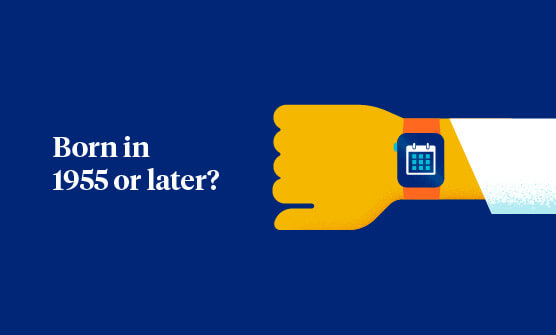
Once upon a time, turning 65 years old meant you could get your full Social Security retirement benefits and Medicare coverage at the same time. But over the last couple of years, the Social Security Administration (SSA) changed the full retirement age twice – first to age 66 for people born from 1948 to 1954, then again to age 67 for people born in 1955 or later.
No matter what full retirement age is required for you to get full Social Security benefits (which you can quickly find using the chart below), Medicare eligibility still begins at age 65.1
| Year of birth | Full retirement age |
|---|---|
1943 – 1954 |
66 years |
1955 |
66 years and 2 months |
1956 |
66 years and 4 months |
1957 |
66 years and 6 months |
1958 |
66 years and 8 months |
1959 |
66 years and 10 months |
1960 |
67 years |
Important things to know about Social Security benefits
Now before we dive into how this may impact Medicare decisions, there are three things to keep in mind.
- You can start collecting benefits as early as age 62, but if you do, you will lose 6.67% of your full benefit amount for up to 3 years and then 5% per year thereafter.
- You can delay collecting benefits after your full retirement age and actually raise your benefits by 8% each year up until age 70, at which point the incentive stops.
- Whatever amount you start receiving is locked in for life.
SSA benefits and Medicare
So let’s go back to how your full retirement age and Medicare may interact. The biggest thing is that in the past, at age 65, you both got your SSA benefits and became Medicare eligible. This meant you could use your SSA benefits to help pay for Medicare. However, with the full retirement age being at least a year or more past 65, you need to think carefully about when you take your SSA benefits if you want to use them for Medicare costs.
Medicare enrollment can be impacted by Social Security benefits
Depending on your situation, you with either need to enroll in Medicare at age 65 or you may be able to delay. If you continue to work past age 65 and have creditable employer coverage (or you have creditable employer coverage through a spouse), you can likely delay enrolling in Medicare until you lose that employer coverage. In most cases, people turning 65 will need to get Medicare during their 7-month Initial Enrollment Period (IEP) to avoid financial penalties for enrolling late. Your IEP begins 3 months before the month of your 65th birthday and ends 3 months after.
Social Security benefits fit in the Medicare enrollment journey in one special way. If you are receiving either Social Security benefits for retirement or for disability, or Railroad Retirement Board benefits, you will be automatically enrolled in Medicare Part A and Part B when you first become eligible.
How Social Security helps pay for Medicare
In addition to automatically enrolling you in Medicare, if you are receiving Social Security or Railroad Retirement Board (RRB) benefits, your Medicare Part B premium will be automatically deducted from your monthly benefit payment.
If you are not receiving Social Security or Railroad Retirement Board (RRB) benefits yet, you will get a bill called a “Notice of Medicare Premium Payment Due” (CMS-500). Bills can be paid for by check or money order, a credit or debit card, or through online bill pay services.
In conclusion, as you’re starting to think about Medicare and retirement, do some research and make sure you understand how your Social Security benefits can or will play a role.
About Medicare Made Clear
Medicare Made Clear brought to you by UnitedHealthcare provides Medicare education so you can make informed decisions about your health and Medicare coverage.
Get the latest
Boost your Medicare know-how with the reliable, up-to-date news and information delivered to your inbox every month.
*All fields required

